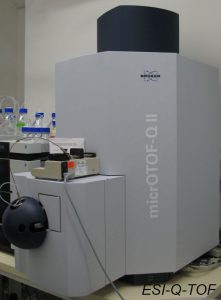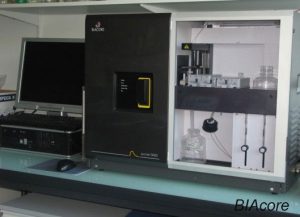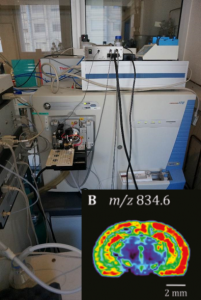PROTEOMICS and METABOLOMICS
SIGNALIFE platform manager: Delphine Debayle
Email: debayle@ipmc.cnrs.fr Phone: 04.93.95.77.52
Address: CNRS
IPMC-CNRS
660 route des lucioles
Sophia Antipolis
06560 Valbonne
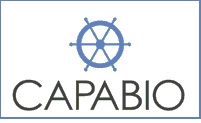 Within the Labex SIGNALIFE, the CAPABIO facilities offer expertise in proteomic as well as metabolomic and lipidomic studies. Two platforms are located on the Sophia campus at IPMC (Jean-Louis Nahon) and ISA (Karine Hugot) and one is located on Nice Pasteur campus (Thierry Pourcher). They strongly interact to propose a complementary offer to the academic scientific community as well as to local private companies. The main expertise relies on proteomics from entire purified protein validation to multiple identifications from complex samples. Technical development on label-free quantitation of proteins is currently a collaborative hot spot. Metabolomics are dedicated either to the diagnosis of metabolic-related animal disorders, together with the identification of metabolic pathways or disease biomarkers, or to plant and fungal secondary metabolites. Lipidomics concern the analysis of lipids in a wide range of organisms (animals…) from various matrices (cells, serum, tissues …)
Within the Labex SIGNALIFE, the CAPABIO facilities offer expertise in proteomic as well as metabolomic and lipidomic studies. Two platforms are located on the Sophia campus at IPMC (Jean-Louis Nahon) and ISA (Karine Hugot) and one is located on Nice Pasteur campus (Thierry Pourcher). They strongly interact to propose a complementary offer to the academic scientific community as well as to local private companies. The main expertise relies on proteomics from entire purified protein validation to multiple identifications from complex samples. Technical development on label-free quantitation of proteins is currently a collaborative hot spot. Metabolomics are dedicated either to the diagnosis of metabolic-related animal disorders, together with the identification of metabolic pathways or disease biomarkers, or to plant and fungal secondary metabolites. Lipidomics concern the analysis of lipids in a wide range of organisms (animals…) from various matrices (cells, serum, tissues …)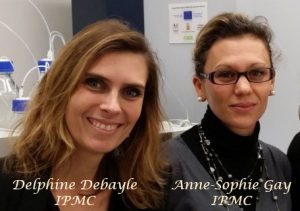

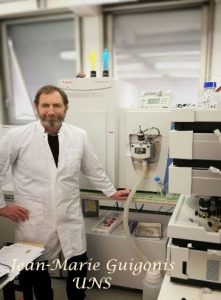
debayle@ipmc.cnrs.fr gay@ipmc.cnrs.fr aurelie.seassau@.inra.fr guigonis@unice.fr
PROTEOMIC AND LIPIDOMIC PLATFORM IPMC
 This platform is equipped with Q-exactive plus mass spectrometer (ThermoFisher). A nano-LC U3000 (ThermoFisher) and a UHPLC (ThermoFisher) enables the separation of peptides or lipids from complex mixtures before MS analysis. Optimal protocols are constantly developed to secure performing results to the different scientific projects hosted by the platform.
This platform is equipped with Q-exactive plus mass spectrometer (ThermoFisher). A nano-LC U3000 (ThermoFisher) and a UHPLC (ThermoFisher) enables the separation of peptides or lipids from complex mixtures before MS analysis. Optimal protocols are constantly developed to secure performing results to the different scientific projects hosted by the platform.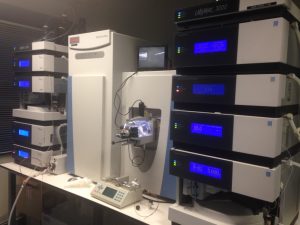
Q-exactive plus with nano-LC or UHPLC
The expertise of IPMC team is mainly on protein identification from semi purified samples (gel electrophoresis, chromatography) including post-translational modification (phospho-, glyco-). Characterization of unknown proteins as well as validation of recombinant ones is routinely carried out.
The platform has expertise in fatty acid content of phospholipids or acylglycerols and in analysis of lipid classes (phospholipids, ceramides, di or triacylglycerols…) from various matrices.
Contact: Delphine Debayle and Anne-Sophie Gay (see picture above).
The platform has expertise in fatty acid content of phospholipids or acylglycerols and in analysis of lipid classes (phospholipids, ceramides, di or triacylglycerols…) from various matrices.
Contact: Delphine Debayle and Anne-Sophie Gay (see picture above).
PROTEOMIC AND METABOLOMIC PLATFORM ISA
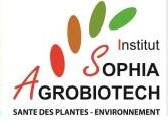 This platform can perform LC/MS and SPR studies. A BIAcore 3000 (GE Healthcare) allows the fine characterization of many diverse interactions from antigene/antibodies to drug/targeted proteins or enzyme/substrates. This platform also possesses an ESI-Q-TOF (MicrOTOF-QII, Bruker Daltonics) that permits proteins and metabolites analyses. The LC is an Ultimate 3000 able to work in nano- or micro- UHPLC mode.
This platform can perform LC/MS and SPR studies. A BIAcore 3000 (GE Healthcare) allows the fine characterization of many diverse interactions from antigene/antibodies to drug/targeted proteins or enzyme/substrates. This platform also possesses an ESI-Q-TOF (MicrOTOF-QII, Bruker Daltonics) that permits proteins and metabolites analyses. The LC is an Ultimate 3000 able to work in nano- or micro- UHPLC mode.
The ISA platform has expertise in protein identification from complex mixtures, post-translational modifications (S-nitrosylation, methylation). As at IPMC, routine characterization of purified and recombinant protein is performed. The high resolution MS also allows the identification of small molecules (like pesticides metabolites and secondary metabolites from plants and fungi). Contact: Aurélie Seassau (see picture above).
PROTEOMIC AND METABOLOMIC PLATFORM TIRO ROSSI
http://www.biophytiro.unice.fr/tiro/B.Rossi
This platform is equipped with a nano-LC, capillaryLC, or UHPLC coupled with an Q-exactive plus mass spectrometer. Platform also has a Ltq/Orbitrap with DESI and AP/MALDI sources dedicated to metabolomics analysis.
It provides service and support to scientists aiming to identify and quantify proteins and to characterize modifications. The analysis of protein mixtures from gel slices, co-immunoprecipitations or enrichments is routinely performed. Identification of proteins from complex samples (cell lysates or tissue extracts…) is also proposed. Our current challenges include the analysis of protein phosphorylation and post-translational modification mapping. In metabolomics, the equipment available allows high throughput analytical measurements of body fluids i.e., serum, urine as well as tissue or biopsies analysis of humans and/or animal models (i.e., rats, mice, etc.). Contact: Jean-Marie Guigonis (see picture above).
Update-January, 2018




